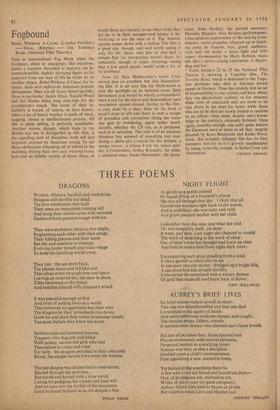Fogbound
REBEL WITHOUT A CAUSE. (London Pavilion.) —TRIAL. (Empire.) — THE TERRIBLE ROAD. (National Film Theatre.)
Tins is International Fog Week when the foreigner, often so engagingly like ourselves. seems a creature shrouded in mystery. an in- comprehensible, slightly alarming figure so fat removed from our way of life he might be on another planet. Rebel Without A Cause, for in- stance, deals with well-to-do American juvenile delinquents. They are all 'crazy mixed-up kids,' three in particular. James Dean, Natalie Wood and Sol Mineo being long over-ripe for the psychiatrist's couch. The cause of their in- stability is traced, of course, to their homes. where a lot of heavy weather is made of weak. nagging, absent or unaffectionate parents. All this is plain sailing, is perfectly acceptable. Another reason, though, which leaps to the British eye but is disregarded in this film, is the appalling lack of discipline, both self and imposed, enjoyed by American young. To see these adolescents whooping off to school in the morning, driving their own cars, wearing funny hats and an infinite variety of fancy dress; to watch them at a lecture; to sec what tricks they get up to in their unsupervised leisure is be wildering to say the least of it. The Atlantic curtain comes down with a wallop. The film is a good one. though. and well worth seeing if only for Mr. Dean. who has. or alas had. a unique flair for interpreting mental chaos. It- solemnity. though, is rather irritating. seeing that a few good spanks would settle a lot of its problems.
Now for Don Mankiewicz's novel Trial turned into an excellent but also discomfort. ing film. It is all very fine for Hollywood to turn the spotlight on its national sores. Such missionary zeal would he wholly commendable were it not for the alarm and despondency such revelations spread abroad. Justice, in this film. is only done by a sheer fluke (in the book it wasn't done at all) and there is such a weight of prejudice and corruption tilting the scales one gets to wondering, again rather bewil- deredly, whether the US can, as is proposed, lead us to salvation. This trial is of an innocent Mexican boy accused of assaulting and mur- dering a white girl. Counsel for the defence, a novice lawyer. is Glenn Ford, his senior part- ner, a Communist. Arthur Kennedy; the judge, a coloured man, Juano Hernandez; the prose-
cigar. John Hodiak; the perfect secretary, Dorothy Maguire. Five flawless performances. Unscrupulous exploitation of the case by Com-, munists. racial prejudice whipped up to lynch- ing point by Fascists, fear, greed, ambition. each laid out under a fierce light and with expert showmanship by Mark Robson, make this film a nerve-racking experience. A depres- sing one too.
From January 22 to 25 the National Film Theatre is showing a Yugoslav film. The Terrible Road, which is dedicated to the Yugo- slav partisans who died in German prison camps in Norway. Time has already lent an air of implausibility to war crimes, and here, where they arc particularly sadistic, as for instance when rows of emaciated men are made to lie face down in the mud for hours while those who are to be shot are slowly picked at random by an officer--they seem, despite one's know- ledge to the contrary, curiously fictional. Once again, stupidly enough, one can't quite believe the Germans were as nasty as all that. Angrily directed by Kore Bergstrom and Rades Nova- kovic, this savagely unhappy film has its finer moments, but for us it is gravely handicapped by being. naturally enough, in Scrbo-Croat and


































 Previous page
Previous page